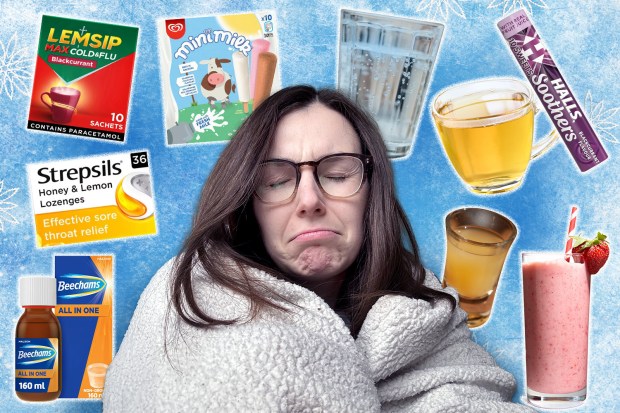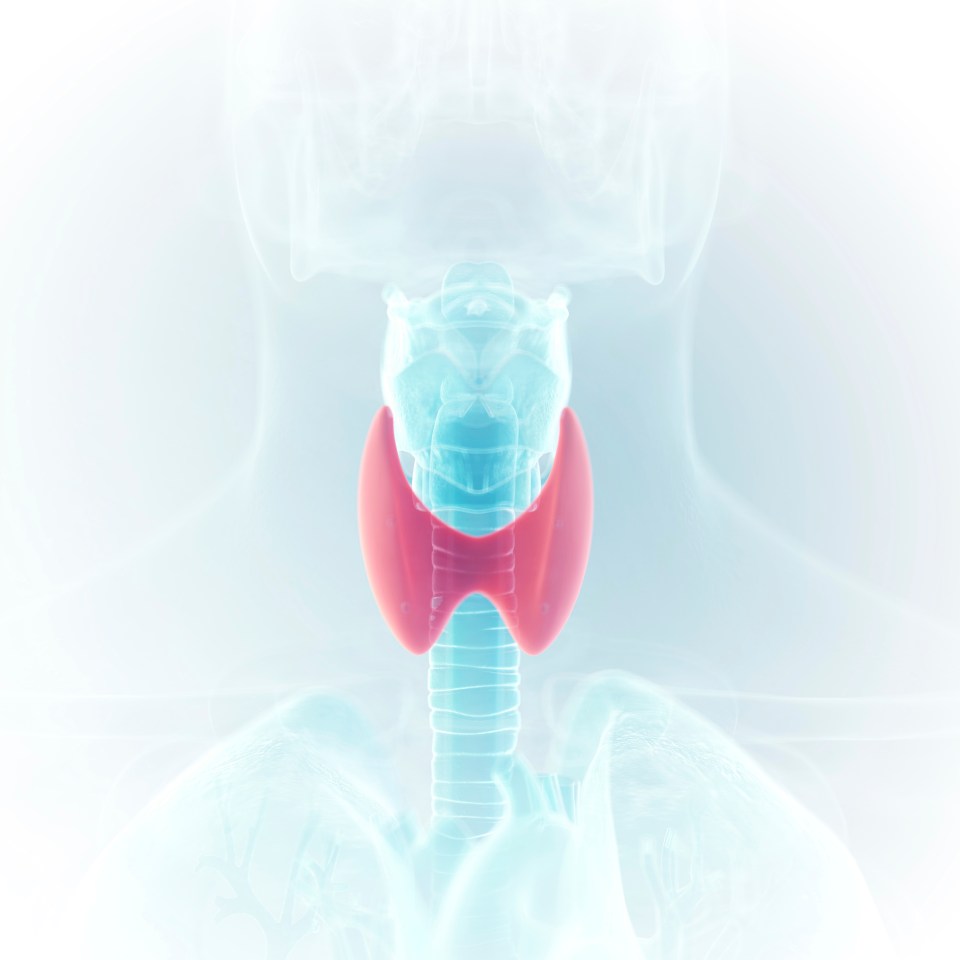NOTICED a scratching or burning feeling in your throat? Or maybe it’s like you’ve swallowed sandpaper or you have an unquenchable thirst?
As we move into autumn and back-to-school bugs run rife, these symptoms are going to be increasingly common – but they’re not always caused by viruses. In fact, thyroid problems, alcohol and even cancer could be to blame.
Dr Kim Goldin, senior GP at Nuffield Health, tells Sun on Sunday Health: “The most common cause for a sore throat is a viral infection, such as a cold or flu.
“Most viral infections, which affect the respiratory system, are airborne and enter the body through the nose or mouth.
“The throat is therefore one of the first areas to become infected and inflamed.
“But there are several other potential causes to be aware of.”
Here, we break down what could be behind yours…
IT’S ALLERGIES…
WHETHER it’s pollen or your pet’s fur, allergies can cause a horrible scratchy feeling in your throat.
“Allergens – like dust, pollen and pet dander – trigger inflammation in the nasal passages,” Dr Suzanne Wylie, GP and medical adviser for IQDoctor, says.
“This often leads to postnasal drip, where mucus falls down the back of the throat, irritating the tissues and making it feel sore.
“Other symptoms include sneezing, itchy or watery eyes, nasal congestion and coughing.
“Unlike infections, allergies do not usually cause a fever.”
Dr Goldin suggests over-the-counter treatments, such as antihistamines.
Symptoms sticking around? Speak to your GP.
IT’S YOUR LIFESTYLE…
IF you’re a smoker or you’ve woken up from a boozy night out, your throat might be acting up.
“Excessive alcohol can cause a persistent or recurring sore throat as it increases inflammation and swelling, damages the lining of the throat and oesophagus, and causes reflux-type symptoms,” says Dr Goldin.
“This results in increased acid build-up, which irritates the throat.”
Smoking triggers similar throat inflammation due to the toxins and irritants in tobacco.
Plus, both booze and cigarettes weaken your immune system, making you more prone to infections.
Coffee, alcohol, tomatoes, chocolate, and fatty or spicy foods could be making your symptoms worse
Dr Suzanne Wylie
Been singing your heart out in the shower, car or karaoke booth? This might also play a role.
“The voice box makes sound through movement and vibrations of the cords and these can become irritated and inflamed by overuse,” says Dr Goldin.
“Simple measures – such as rest, soothing drinks, lozenges and good hydration – can help relieve symptoms.”
IT’S TONSILLITIS…
CONTRARY to popular belief, tonsillitis isn’t just a childhood illness. It actually affects about four in 100 adults every year in the UK.
“Tonsillitis is inflammation of the tonsils – the two round bits of flesh in the back of your throat,” Dr Wylie says.
“It’s usually caused by a viral infection, though bacteria can be responsible.”
As well as a sore throat, you might notice redness, swelling, white or yellow patches, a fever, bad breath and tiredness.
“See a doctor if symptoms are severe, persistent or recurrent, or if there is any difficulty breathing or swallowing,” she adds.
If bacterial tonsillitis is suspected, antibiotics may be prescribed. If it’s caused by a virus, then rest, fluids and pain relief will help.
IT’S ACID REFLUX…
AROUND a fifth of UK adults experience severe acid reflux.
Also known as gastro-oesophageal reflux disease (GORD), it causes a sore throat because stomach acid rises into the oesophagus and reaches the throat, irritating the lining.
“Other symptoms include heartburn, regurgitation of food or sour liquid, a persistent cough, hoarseness, hiccups and the sensation of a lump in the throat,” Dr Wylie says.
“Lifestyle changes – such as avoiding large or late meals, losing weight if appropriate and raising your bed so your head is above your waist – can help.
“Coffee, alcohol, tomatoes, chocolate, and fatty or spicy foods can make acid reflux worse, so limit these when you can, and stop eating three to four hours before going to sleep.
“Treatments may include over-the-counter antacids or prescription medicines that reduce stomach acid, such as proton pump inhibitors,” says Dr Wylie.
I tested 9 popular sore throat remedies

By Alice Fuller, Health Features Editor
WHEN I feel a sore throat coming, I just know I’m going to get ill. It starts with a light tickle then develops into an agonising scratchiness that makes it painful to swallow.
This can last for days on end before my other inevitable symptoms – coughing, a headache and a fever – arrive.
But is there anything you can do to ease your sore throat in that awful in-between time? I set out to find out.
As soon as I clocked mine coming, I put nine popular remedies to the test.
- Strepsils – 3/5
- Hot honey and lemon – 3/5
- Salt water gargle – 1/5
- Soothers – 3/5
- Lemsip Max Cold and Flu – 5/5
- Ice lollies – 2/5
- Beechams All in One Liquid – 4/5
- Smoothie – 2/5
- Ginger shot – 1/5
You can read my full verdict – and what Abbas Kanani, superintendent pharmacist at Chemist Click, has to say – on each one here.
IT’S A THYROID PROBLEM…
THE thyroid is a butterfly-shaped gland in the neck which produces hormones.
Despite its small size, it holds a lot of power – so when it doesn’t work properly, you know about it!
“Thyroid problems can sometimes cause a sore throat, particularly if the gland becomes inflamed, as in thyroiditis, or if it enlarges, putting pressure on surrounding tissues,” Dr Wylie says.
“Other symptoms that may suggest thyroid disease include swelling in the neck, difficulty swallowing, hoarseness, fatigue, weight changes, heat or cold intolerance, and changes in heart rate.”
If your sore throat doesn’t ease off, book an appointment with your GP.
“They can examine your neck, arrange blood tests to check your thyroid function, and refer you for further testing or to see a specialist if needed,” says Dr Wylie.
IT’S STREP A…
STREPTOCOCCUS pyogenes – known as Strep A – is a bacteria which usually causes mild infections. In some cases, however, it can be serious.
“Strep throat affects the throat and tonsils,” Dr Wylie says. “Unlike viral sore throats, this develops quickly and tends to cause more severe pain.”
You may also have difficulty swallowing, red and swollen tonsils that sometimes have white patches or streaks of pus, a fever, swollen glands, and a red rash.
“A cough and runny nose are not common features, helping distinguish it from a viral infection,” Dr Wylie adds.
If you have a severe sore throat which came on suddenly and is accompanied by the symptoms above, see a doctor.
“They can take a throat swab to confirm the diagnosis,” she says.
“You may be prescribed antibiotics to shorten the illness, prevent complications and reduce the chances of spreading it to others.”
IT COULD BE CANCER…
THERE is a small chance your sore throat could be caused by cancer.
It’s a potential sign of laryngeal, throat, lung, oesophageal and thyroid cancer.
“Other possible symptoms include hoarseness, difficulty swallowing, unexplained weight loss, persistent earache, a lump in the neck or coughing up blood,” adds Dr Wylie.
“It’s important to see a doctor if a sore throat lasts longer than three weeks, or if it is associated with these warning signs.”
Your GP may arrange an urgent referral to a specialist for further tests.
When to worry about your sore throat
The NHS says you should see your GP if:
- Your sore throat does not improve after a week
- You often get sore throats
- You’re worried about your sore throat
- You have a sore throat and a very high temperature, or you feel hot and shivery
- You have a weakened immune system – for example, because of diabetes or chemotherapy
Call 999 if you or your child:
- Has difficulty swallowing or breathing
- Are drooling – this can be a sign of not being able to swallow
- Are making a high-pitched sound as you breathe (called stridor)
- Has severe symptoms and are getting worse quickly
















